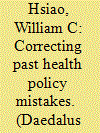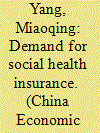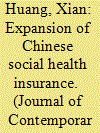| Srl | Item |
| 1 |
ID:
130400


|
|
|
|
|
| Publication |
2014.
|
| Summary/Abstract |
China's health policy in the 1980s followed its economic policy of marketization. China shifted health financing from public to private and commercialized the country's public health services. Unwittingly, the Chinese government did not grasp the serious market failures in health care, which resulted in a profit-driven public health service in which patients pay directly for services. China's health policy created three major unintended consequences: disparity between rural and urban residents, poor quality of health care, and rapid inflation in health expenditures. Since 2003, China has tried to correct its policy mistakes through public financing and by establishing social health insurance. However, strong profit motives have become embedded within the culture of medical professionals and have eroded the professional ethics that prioritize medical practices for patients' benefits. Restoring medical ethics is a formidable challenge. This paper analyzes the transformation of the Chinese health system and its ongoing challenges.
|
|
|
|
|
|
|
|
|
|
|
|
|
|
|
|
| 2 |
ID:
163336


|
|
|
|
|
| Summary/Abstract |
This paper assesses the determinants of the enrolment in the New Rural Cooperative Medical Scheme (NRCMS), a heavily subsidized voluntary health insurance scheme in rural China. The analyses focus on the relationship between insurance purchase and health facility choice based on data drawn from the China Health and Nutrition Survey (CHNS). The results show that households from villages that reported use of village clinics are more likely to be insured compared with households from villages that reported use of county hospitals. The results indicate that the perception of quality of care is an important factor affecting people's enrolment decisions. The NRCMS is expected to help patients obtain better quality health services from higher-tier of the healthcare system that are unaffordable otherwise. However, given the prevailing fee-for-service payment mechanism for health care, the insurance may also drive up the healthcare cost and direct patients to use more expensive and unnecessary hospital care.
|
|
|
|
|
|
|
|
|
|
|
|
|
|
|
|
| 3 |
ID:
133816


|
|
|
|
|
| Publication |
2014.
|
| Summary/Abstract |
This article asks 'who gets what, when and how' from China's recent social welfare expansion. Little research to date examines the overall landscape of China's social health insurance, which has changed dramatically since 2003, and the distributive consequences and implications thereof. Drawing on public survey data and fieldwork for empirical support, this article finds that China's recent social health insurance expansion does significantly expand people's access to social health insurance. However, the expansion, which entails health insurance fragmentation and increasing benefit disparities, not only reinforces existing social cleavages such as the rural-urban divide, but it also generates new divisions within urbanites and workforce. Moreover, multiple social cleavages that cross-cut class differences have been institutionalized into China's social health insurance system. This reflects authoritarian regimes' 'divide and rule' tactic in social welfare provision.
|
|
|
|
|
|
|
|
|
|
|
|
|
|
|
|